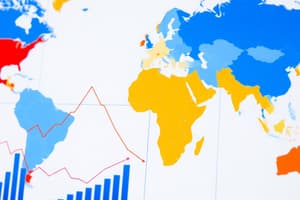Podcast
Questions and Answers
What type of investment involves purchasing foreign stocks, bonds, and other financial instruments?
What type of investment involves purchasing foreign stocks, bonds, and other financial instruments?
- Joint Venture
- Direct investment
- Wholly owned subsidiary
- Foreign portfolio investment (correct)
What is the primary purpose of trade barriers?
What is the primary purpose of trade barriers?
- To protect local businesses and generate revenue (correct)
- To encourage international trade
- To promote foreign investment
- To reduce tariffs and quotas
What type of agreement grants a company permission to use a product, service, brand name, or patent in exchange for a fee or royalty?
What type of agreement grants a company permission to use a product, service, brand name, or patent in exchange for a fee or royalty?
- Franchising agreement
- Joint Venture
- Licensing agreement (correct)
- Exclusive distribution rights
What is the term for a limit on the amount of a product that can be imported during a certain period of time?
What is the term for a limit on the amount of a product that can be imported during a certain period of time?
What is the purpose of imposing trade embargos and trade sanctions?
What is the purpose of imposing trade embargos and trade sanctions?
What type of business arrangement involves an independent business owner using the name, service, products, and marketing of another company?
What type of business arrangement involves an independent business owner using the name, service, products, and marketing of another company?
Which of the following is NOT a factor that affects exchange rates?
Which of the following is NOT a factor that affects exchange rates?
What is the primary goal of currency speculating?
What is the primary goal of currency speculating?
What is the result of a currency devaluating due to supply exceeding demand?
What is the result of a currency devaluating due to supply exceeding demand?
What is the purpose of the Investment Canada Act?
What is the purpose of the Investment Canada Act?
Flashcards are hidden until you start studying
Study Notes
Modes of International Business
- Foreign portfolio investment involves buying foreign stocks, bonds, and other financial instruments to invest in businesses.
- Importing involves bringing products or services into a country.
- Global sourcing involves buying equipment, capital goods, raw materials, or services from around the world.
- Exporting involves selling goods or services to another country.
- Licensing agreements grant permission to use a product, service, brand name, or patent in exchange for a fee or royalty.
- Exclusive distribution rights allow a company to be the only distributor of a product in a geographic area or specific country.
- Franchising involves an agreement to use a company's name, service, products, and marketing, with the franchisee signing a contract and agreeing to follow the franchisor's rules.
- Joint ventures occur when two businesses form a new company with shared ownership.
- Foreign subsidiaries, also known as "wholly owned subsidiaries", are independent entities of a parent company in another country.
Trade Barriers
- Trade barriers are government-set rules and regulations to protect local businesses, generate revenue, and protect citizens from harmful products.
- Protectionism is a shield against foreign competition.
- Tariffs are taxes or duties charged on imported products or services, raising the cost to encourage local purchases.
- Trade quotas are government-imposed limits on the amount of product that can be imported in a certain period.
- Trade embargos are complete bans on trade between countries.
- Trade sanctions are partial embargos limiting trade of specific products or with specific countries or individuals.
Foreign Investment Restrictions
- Regulations around foreign investments include the Investment Canada Act, the Bank Act, the Transportation Act, the Broadcasting Act, and the Telecommunications Act.
International Trade Barriers
- Standards, such as environmental protection, voltage, health, and safety, vary depending on the country.
- Time zone differences create challenges in the international business world.
- Currency fluctuations create uncertainty in pricing goods and services.
- Exchange rates are affected by economic conditions, trade, politics, and psychological factors.
Currency Fluctuations
- Currency speculating involves buying, holding, or selling foreign currency to profit from value changes.
- The Canadian dollar is relatively lower than the USD due to currency speculating.
- Factors affecting exchange rates include economic conditions, trade, politics, and psychological factors.
Studying That Suits You
Use AI to generate personalized quizzes and flashcards to suit your learning preferences.




